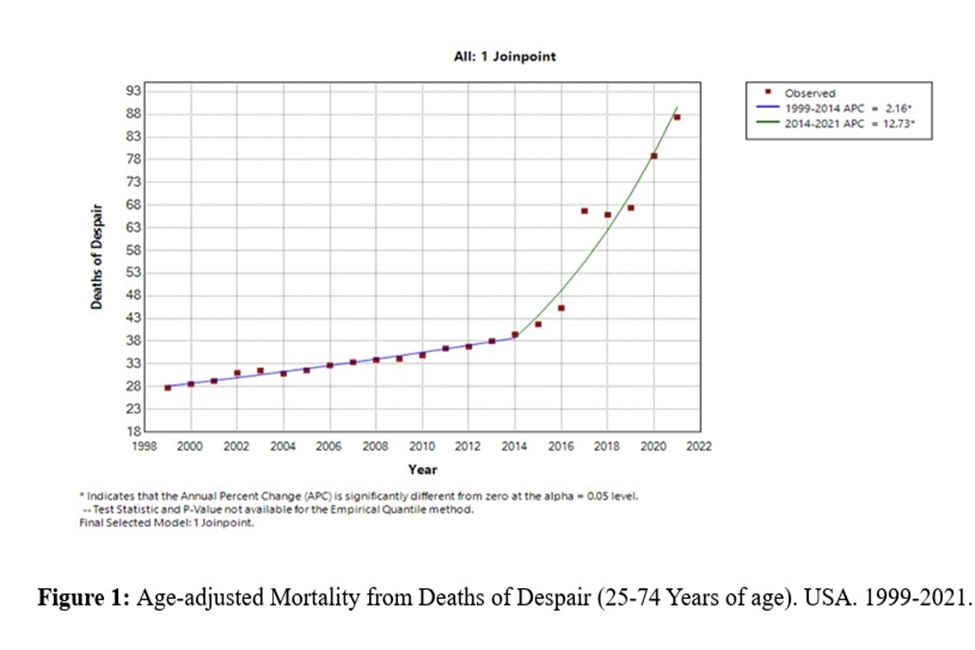'Deaths of Despair' More than Double in the U.S. Over Two Decades

The International Classification of Diseases (ICD) is a global standard for classifying diseases, deaths and health conditions and has been used for more than a century. It assigns diagnostic codes to categorize diseases and their causes, aiding in health data, statistics and clinical documentation. Now in its 11th revision, the ICD is crucial for epidemiology, health care and policy.
While the ICD assumes each disease is distinct, the idea that different diseases may share underlying causes has led to the emerging concept of “deaths of despair.” Deaths of despair include fatalities caused by suicide, drug overdose and alcohol-related diseases.
In a new study, researchers from Florida Atlantic University’s Schmidt College of Medicine explored temporal trends in the occurrence of deaths of despair in the United States from 1999 to 2021 among those aged 25 to 74.
Researchers used the previously defined and widely accepted definition of deaths of despair as a constellation of 19 underlying causes which included: chronic hepatitis; liver fibrosis/cirrhosis; suicide/sequelae of suicide; poisoning (accidental or undetermined intent) or exposure to nonopioid analgesics, antipyretics, rheumatic, antiepileptic’s, sedative hypnotics, antiparkinson and psychotropic drugs; narcotics, psychodysleptics, drugs acting on the central nervous system; and alcohol.
The study, published in the peer reviewed journal, Advances in Preventive Medicine and Health Care, reveals a disturbing rise in deaths of despair among individuals 25 to 74 years of age over the past two decades. From 1999 to 2021, the annual percent change in deaths of despair increased two-and-a-half-fold. Using this classification, by 2021, deaths of despair would have become the fifth leading cause of death in the U.S. The 176,386 deaths would have followed heart disease (695,547 deaths), malignant neoplasms (605,213 deaths), COVID-19 (416,893 deaths), and accidents (224,835 deaths).
“These data underscore the public health challenges deaths of despair present and to advocate for comprehensive strategies that address both their clinical and socio-economic risk factors,” said Panagiota (Yiota) Kitsantas, Ph.D., senior author and professor and chair, Department of Population Health and Social Medicine, Schmidt College of Medicine. “Policymakers should consider integrating mental health and substance use services into primary care to reduce stigma and improve access.”
For the study, researchers used the U.S. Centers for Disease Control and Prevention’s (CDC) publicly available Wide-Ranging Online Data for Epidemiologic Research (WONDER) and Multiple Cause of Death files.
“These data are descriptive and useful to generate hypotheses,” said Charles H. Hennekens, M.D., FACPM, co-author and the first Sir Richard Doll Professor of Medicine and Preventive Medicine, Schmidt College of Medicine. “Our findings may aid health care providers and policy makers, especially in regions of highest risk.”
The researchers also report that as of 2022, rates from deaths of despair among Black individuals were higher than white individuals and were highest among American Indian or Alaska Natives.
“Tackling the rise in deaths of despair requires a multi-faceted approach, combining medical, social and economic interventions,” said Maria Carmenza Mejia, M.D., FACPM, FASAM, first author and a professor in the Department of Population Health and Social Medicine, Schmidt College of Medicine. “Research to elucidate their risk factors is crucial, along with evidence-based policies to reduce them. The medical community also should continue to advocate for including social determinants of health in disease classification systems like the ICD to ensure they are addressed in clinical practice and public health policy.”
The final study co-author is Robert S. Levine, M.D., FACPM, an affiliate professor of family medicine, Schmidt College of Medicine.

-FAU-
Latest News Desk
- FAU Establishes Professorship in Jain StudiesThe Department of Philosoph recently announced the establishment of the Bhagavan Sambhavnath Endowed Professorship in Jain Studies.
- FAU Historian Traces How U.S. Nursing Homes Evolved into Big BusinessA historian explores how the Americana Corporation shaped modern nursing homes, revealing how architecture tied aging, care and profit into a system that still defines long-term care in the U.S. today.
- Notice of Proposed Changes to Non-Resident Tuition FeesFlorida Atlantic now considering a tuition adjustment for non-resident students to begin in Fall 2026.
- FAU Hosts 'Engineer Your Future Day'Florida Atlantic University's College of Engineering and Computer Science recently hosted "Engineer Your Future Day" at the Carole and Barry Kaye Performing Arts Auditorium.
- Where a Child Lives - Not Just Diet - Raises Type 2 Diabetes RiskFAU researchers found poor walkability, litter, and reliance on assistance programs are strongly linked to type 2 diabetes risk in young children, based on a large nationwide study.
- FAU BEPI: Economic Strain Hits Hispanic Households Hard in 3rd QuarterHispanic consumer confidence dropped in the third quarter of the year as uncertainty and increased prices placed added pressure on their budgets, according to a poll from Florida Atlantic University's BEPI.






